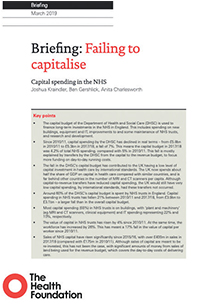Long-term plan capital threat
The Health Foundation said lack of capital investment could dent plans to improve cancer survival rates and make the NHS a world leader in technology-driven care.
The foundation’s report, Failing to capitalise, said trusts have seen their capital funding decline by 21% over the past eight years – from £3.9bn in 2010/11 to £3.1bn in 2017/18. This was mostly due to the transfer of capital to revenue funding in the past five years. This year alone, £500m has been transferred to revenue to cover the rising day-to-day costs of running the service, it said.
This was mostly due to the transfer of capital to revenue funding in the past five years. This year alone, £500m has been transferred to revenue to cover the rising day-to-day costs of running the service, it said.
Backlog maintenance had risen from £4.4bn in 2013/14 to more than £6bn in 2017/18, about double the annual capital spending in trusts.
The foundation also calculated that, expressed as a share of GDP, NHS capital spending is half that in similar countries. Even without the capital to revenue transfer, spending would still be relatively low.
The NHS in England would have to spend an extra £3.5bn a year to bring capital spending up to the OECD average. This figure would have to rise to £4.1bn by 2023/24 for the NHS to continue to keep pace. The report warned that failing to outline a long-term capital funding settlement could affect future patient care.
With capital spending relatively low, the desire to put the NHS ahead of others in terms of technology- and data-driven care appeared unrealistic. IT spending had risen, but still made up less than 5% of the total value of NHS capital.
The government did not commit to increases in capital spending when it announced the additional £20.5bn for the NHS over five years beginning in April. It is expected the spending review will allocate capital, but timing is uncertain – the chancellor announced in his spring statement that the timing would depend on agreement of a Brexit deal, though the aim was to announce the spending review conclusions with autumn’s Budget.
Anita Charlesworth, Health Foundation director of research and economics, said capital investment was essential. ‘Capital investment is not a nice-to-have,’ she said. ‘Failing to carry out repairs and invest in modern equipment and technology puts at risk the quality of patient care. It will also undermine the NHS’s ability to improve and transform care in line with the NHS long-term plan.
‘Just bringing capital funding for the health service in England up to the OECD average would require around £3.5bn extra next year, rising to £4.1bn by 2023/24.’
Among the finance directors interviewed for the report, one said the age of equipment had an impact on productivity and efficiency. Another said some equipment was so old that spare parts were no longer available. Parts had to be machined to make them fit, which compromised resolution of the machines and affected the quality of care outcomes.Related content
We are excited to bring you a fun packed Eastern Branch Conference in 2025 over three days.
This event is for those that will benefit from an overview of costing in the NHS or those new to costing and will cover why we cost and the processes.